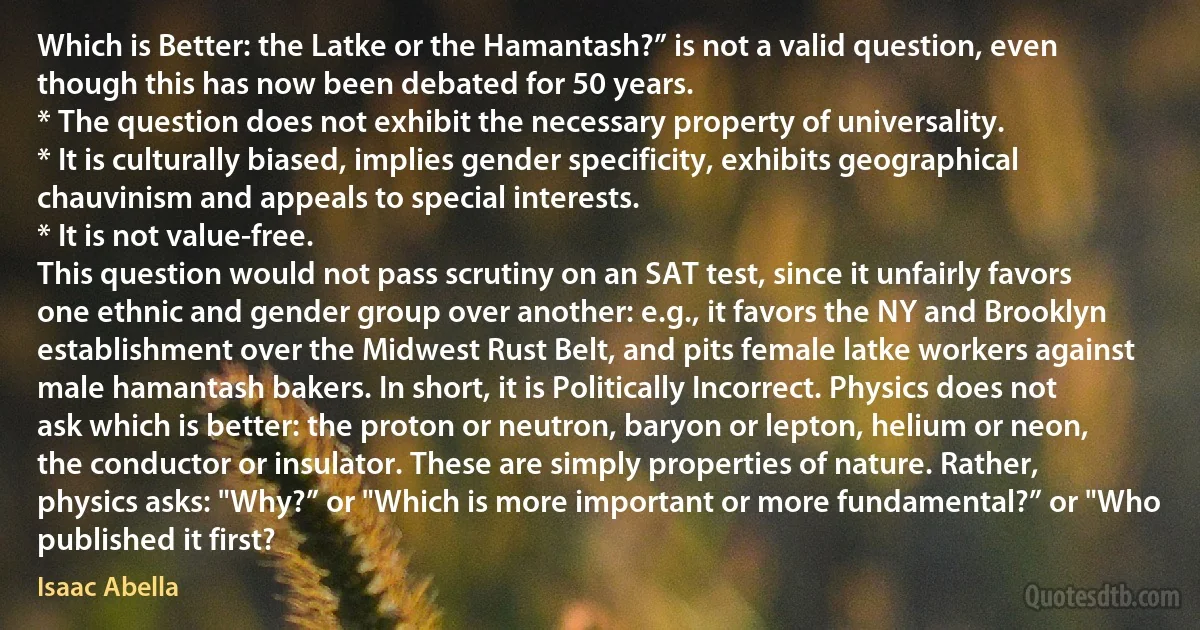
Which is Better: the Latke or the Hamantash?” is not a valid question, even though this has now been debated for 50 years. * The question does not exhibit the necessary property of universality. * It is culturally biased, implies gender specificity, exhibits geographical chauvinism and appeals to special interests. * It is not value-free. This question would not pass scrutiny on an SAT test, since it unfairly favors one ethnic and gender group over another: e.g., it favors the NY and Brooklyn establishment over the Midwest Rust Belt, and pits female latke workers against male hamantash bakers. In short, it is Politically Incorrect. Physics does not ask which is better: the proton or neutron, baryon or lepton, helium or neon, the conductor or insulator. These are simply properties of nature. Rather, physics asks: "Why?” or "Which is more important or more fundamental?” or "Who published it first?
Isaac AbellaRelated topics
ask belt chauvinism conductor establishment ethnic female fundamental gender geographical helium incorrect male nature necessary now pass property question rust short universality years neon Brooklyn midwest neutron proton specificityRelated quotes
The rights of the individual are of no less importance to immigrants and minorities in Europe and the Americas than to women in Afghanistan or children in Africa. They are as fundamental to the poor as to the rich; they are as necessary to the security of the developed world as to that of the developing world.
From this vision of the role of the United Nations in the next century flow three key priorities for the future: eradicating poverty, preventing conflict, and promoting democracy. Only in a world that is rid of poverty can all men and women make the most of their abilities. Only where individual rights are respected can differences be channelled politically and resolved peacefully. Only in a democratic environment, based on respect for diversity and dialogue, can individual self-expression and self-government be secured, and freedom of association be upheld.

Kofi Annan
Why should we put up with the present evils in our society? As opposed to the society we are visualizing, the present one can be described as a diseased one. The evils are there on all levels, international and national, and even within the smaller units such as towns and families. Of course, the disease did not appear like a bolt from the blue, either yesterday, or last year. It is the result of factors that have deep roots and long lives. These consist of privations, discriminations oppressions, bigotries, hatreds, and hostilities; poverty, ignorance, hunger, and illiteracy. Each and all of these have been left to us as ar evil heritage from the past. The fundamental difference between our situation today and that of our forefathers is that now knowledge has enabled us to realize that these evils are neither natural nor inevitable in the same way as we have found that cholera or the bubonic plague are not necessary calamities.

Muhammad Reza Pahlavi
THEY who are acquainted with the present state of the theory of Symbolical Algebra, are aware, that the validity of the processes of analysis does not depend upon the interpretation of the symbols which are employed, but solely upon the laws of their combination. Every system of interpretation which does not affect the truth of the relations supposed, is equally admissible, and it is thus that the same process may, under one scheme of interpretation, represent the solution of a question on the properties of numbers, under another, that of a geometrical problem, and under a third, that of a problem of dynamics or optics. This principle is indeed of fundamental importance; and it may with safety be affirmed, that the recent advances of pure analysis have been much assisted by the influence which it has exerted in directing the current of investigation.

George Boole
It may be observed of mathematicians that they only meddle with such things as are certain, passing by those that are doubtful and unknown. They profess not to know all things, neither do they affect to speak of all things. What they know to be true, and can make good by invincible arguments, that they publish and insert among their theorems. Of other things they are silent and pass no judgment at all, choosing rather to acknowledge their ignorance, than affirm anything rashly. They affirm nothing among their arguments or assertions which is not most manifestly known and examined with utmost rigour, rejecting all probable conjectures and little witticisms. They submit nothing to authority, indulge no affection, detest subterfuges of words, and declare their sentiments, as in a court of justice, without passion, without apology; knowing that their reasons, as Seneca testifies of them, are not brought to persuade, but to compel.

Isaac Barrow
...There are three groups in Hindustan which are known for the qualities of fanaticism and zeal. So long as these three are not exterminated, no king can feel secure, nor any noble. The people (read Muslims) also will not be able to live in peace.
Religious as well as worldly interests dictate that soon after winning the war with the Marhatahs, you should turn towards the forts of the Jats, and conquer them with the blessings from the hidden (occult) world. Next is the turn of the Sikhs. This group should also be defeated, while waiting for grace from Allah.
...I appeal to you in the name of Allah and his Prophet that you should not cast your eye on the property of any Muslim. If you take care in this regard, there is hope that the doors of victory will be opened to you one after another. But if this caution is ignored, I fear that the wails of the oppressed may become obstacles in the way towards your goal.

Shah Waliullah Dehlawi
